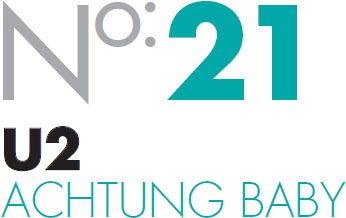
Island
Produced by Daniel Lanois and Brian Eno
Released: November 1991
TRACKLISTING
01 Zoo Station
02 Even Better Than the Real Thing
03 One
04 Until the End of the World
05 Who’s Gonna Ride Your Wild Horses
06 So Cruel
07 The Fly
08 Mysterious Ways
09 Trying to Throw Your Arms Around the World
10 Ultraviolet (Light My Way)
11 Acrobat
12 Love Is Blindness
This time, Berlin was calling. America, as both a destination and an idea hefty enough for their ambitions, had drawn U2 from their earliest days. Since their beginnings they had toured heavily there. But after the success of 1986’s The Joshua Tree, which sold a staggering 25 million copies worldwide, the group took on the US’s iconography and obvious pleasures, resulting in the patchy and imitative Rattle and Hum. If they’d continued on that path, cliché and stagnation awaited them. Instead they decamped to Berlin, where a year’s worth of sessions began that resulted in Achtung Baby, the record that reinvented U2 and created an exciting new framework for arena rock.
The album returned rock & roll to Europe, admitting lust and existential doubts, tenderness and cruelty to a list of inspirations that had narrowed as groups became ever more anthemic. Achtung Baby would subsequently scale up with little problem into stadium-filling material, but at the time it was a radical rebirth. ‘And I must be an acrobat/To talk like this and act like that,’ the quartet’s vocalist, Bono, sang on ‘Acrobat’, and it exemplified a record where noble sentiment is undercut by reality and the song’s protagonists know that a coarse reality awaits them.

From the opening track, ‘Zoo Station’, Bono’s bandmates – the Edge on guitar, Adam Clayton on bass and Larry Mullen Jr on drums – redraw their parameters. The song’s intro sounds like a train rattling ever closer on the Berlin S-Bahn system, with industrial guitar squalls and a distant rhythm drawing into alignment. Bono sounds like he’s on a shortwave radio, negotiating at some kind of surreal stand-off (‘I’m ready/I’m ready for the laughing gas,’ he whispers). But the effect is not to simply muddy U2’s virtue, it’s to provide a bottom end that makes any ascension thrilling. It gives U2 a full spectrum to range across.
The input of Brian Eno, a co-producer and catalyst alongside Daniel Lanois, was crucial (he was back in Hansa Studios, where he’d helped David Bowie cut Heroes 15 years prior). But the band knew they wanted something new, even if they initially couldn’t agree on just what. Rather than pay homage to the past, with Achtung Baby U2 addressed its future with a percussive liveliness that suggested an appreciation of hip-hop and club sounds. A lithe, funky, groove-powered single ‘The Fly’, anchoring Bono’s leaps into falsetto.
There’s barely a speck of sunshine in these songs. They’re songs for the night; a night that gets steadily more compromised as it unfolds. The optimism of ‘Even Better Than the Real Thing’, where the Edge metaphorically burns his cowboy hat with a sequence of subtle, sighing guitar effects and a serrated solo, gives way to sustained pleas for a troubled relationship to endure – ‘feel like trash,’ the singer confesses on ‘Ultraviolet (Light My Way)’, ‘you make me feel clean’. The personal replaces the political on Achtung Baby, and Bono’s focus on the intimate struggle two people share makes for a soulful, adult perspective.
In such conditions a pledging of faith has genuine spirituality, and with ‘One’, a tremulous ballad of supple keyboards and a genius bassline, U2 found a centrepiece for these songs, and one whose optimism was earnt amidst the double-dealing and personal flaws that surrounded it. The song gets stronger, but not larger, and the sentiment – ‘Carry each other/Carry each other’ – stays true. The song, like the album, made U2 relevant at a time of great change. Grunge and electronic music would render many of U2’s contemporaries from the 1980s redundant, but Achtung Baby delivered greatness.